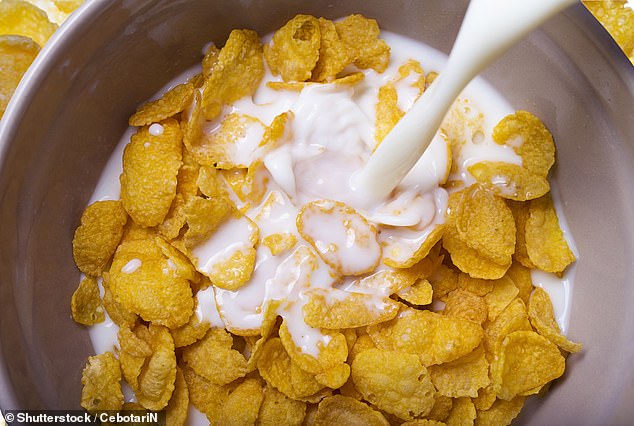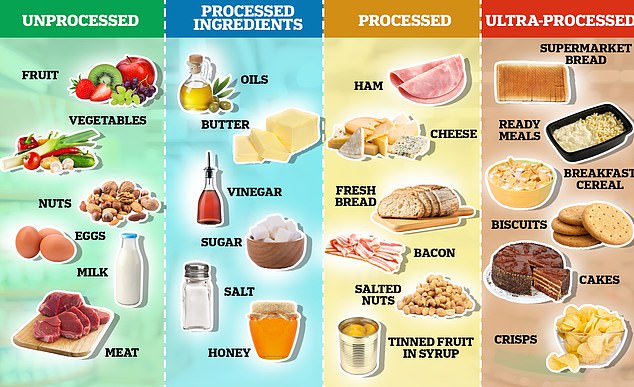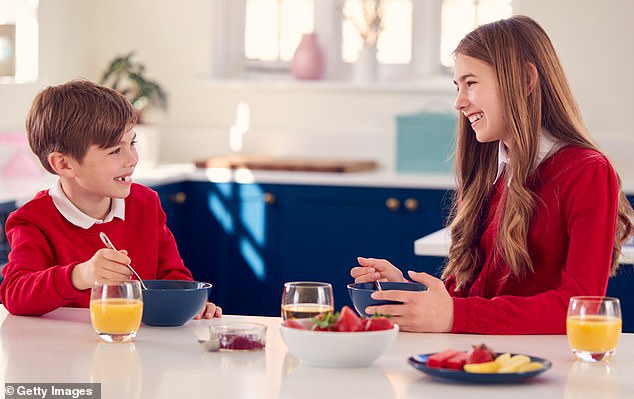Diet Doctor Reveals the Foods Kids Should NEVER Eat for Breakfast – and the Cereals They Can Choose Instead
A top dietitian has railed against the social media trend of giving children meat for breakfast – and warned against one British favorite in particular.
Dr. Federica Amati, chief nutritionist at popular diet app Zoe, raised concerns about parents advocating a low-carb diet for their children and swapping cereal for a meat-heavy breakfast.
On the Zoe podcast, she said ultra-processed meats like bacon can be particularly harmful, due to links to several types of cancer.
“There are voices online telling people not to give their kids carbs in the morning and not to give them bacon,” says Dr. Amati.
‘Please don’t give your children processed meat.’
Ultra-processed meats such as bacon and sausage contain preservatives that interact with substances in the intestines to increase the risk of developing tumors.
Besides sugary breakfast cereals, pastries and sweet yogurt, there is one food in particular. Dr. Amati emphasizes that parents should not feed their children for breakfast – and that is bacon.

In a podcast episode with Zoe co-founder Jonathan Wolf about the difficulty of breaking children’s habit of eating ultra-processed foods (UPF), Dr. Amati warned parents about the dangers of certain breakfast foods.

An easy sign that a food may be a UPF is if it contains ingredients you wouldn’t find in your kitchen cupboard, such as unrecognizable dyes, sweeteners and preservatives. Another clue is the amount of fat, salt and sugar contained in each package, with UPFs typically containing large amounts
According to a 2019 study by researchers at the University of Oxford, eating more than 70 grams of red meat per day increases the risk of colon cancer by five percent. This amount corresponds to two slices of bacon or half a burger.
The NHS recommends eating no more than two portions of processed red meat per week.
Dr. Amati, who is also a scientist at Imperial College London, has urged parents not to ‘be afraid of carbs’.
She explains that it is crucial that children consume enough carbohydrates to ‘stimulate their growth and activity’, as the nutrient is quickly converted into energy by the body.
Fellow podcast guest Rhiannon Lambert, author of the Sunday Times bestseller The Science of Plant-Based Nutrition, among others, emphasized that carbohydrates are actually ‘our brain’s favorite fuel source’.
She explained that it is important to give children ‘good quality’ carbohydrates, such as low-sugar wholegrain cereals such as Weetabix and bread.

To reduce added sugars, you can replace sweet yogurt with natural yogurt with honey, fruit or dark chocolate to flavor it. Dr. Amati suggests making a yogurt bowl with fruit, nuts, and seeds, or even sprinkling on some Cheerios as a topper for your child’s breakfast.

A convenient breakfast food that Dr. Amati parents should avoid is flavored yogurt, as each small jar may contain a teaspoon of sugar
The experts warned parents against choosing products with claims such as ‘high protein’, as many of these foods also contain added sugars and additives.
Dr. Amati added that on average, British children are exposed to 15 billion junk food advertisements every year.
“We currently live in a world where children are more accustomed to opening a bag or packet of chips than peeling a banana,” she said.
Ultra-processed foods (UPFs), which can include biscuits, sausages, chips and industrially manufactured sliced bread, typically contain ingredients that are not or very rarely used in home cooking, such as colorings and sweeteners.
For example, about 95 percent of bakery products, such as processed white bread and pastries, contain at least one emulsifier.
These are mixed into food to help bind fats and water, improving the texture, appearance and shelf life of food.
But according to Dr. Amati, they can disrupt the microbiome—the microbes in your gut that help you digest food—and cause inflammation in the gut.
She explains that inflammation contributes to a ‘higher risk of feeling unwell’, adding that it can cause irritable bowel syndrome (IBS) and indigestion.
But a long-term increase in inflammation in the gut can also increase the risk of “developing obesity, type 2 diabetes and developing autoimmune diseases,” she said.
As for the breakfasts the experts recommend, they recommend sticking to Weetabix, Shredded Wheat and Bran Flakes.
Although Dr. Amati admits that they are “boring,” she explains that they have fewer calories and sugar than Honey Loops, Fruit Loops and Frosties.
Other breakfast foods she suggests include eggs, chopped apples, adding an avocado to a smoothie and, surprisingly, pancakes.
Pancakes can be “absolute nutritional powerhouses,” she said, suggesting making them with a banana, oats and some eggs for a nutritious breakfast.
